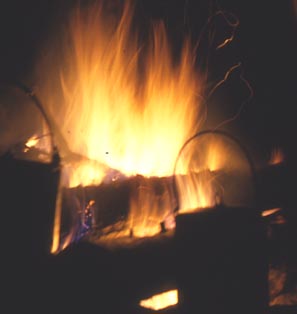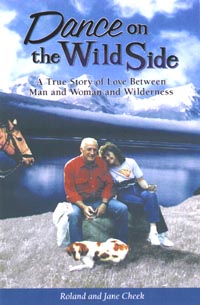a weblog sharing info on outdoor skills and campfire musing by a guy who spends a bunch of time in pursuit of both
CULTURE
WHERE -
TALES ARE TOLD OF
Welcome to Roland Cheek's Weblog
Roland is a gifted writer with a knack for clarifying reality. Looking forward to more of his wisdom
- Carl Hanner e-mail
Aldo Leopold wrote in A Sand County Almanac: "When I first saw the West, there were grizzlies in every major mountain mass." Then he added, ". . . Of the 6000 grizzlies officially reported as remaining in areas owned by the United States, 5000 are in Alaska. Only five states have any at all. There seems to be a tacit assumption that if grizzlies survive in Canada and Alaska, that is good enough. It is not good enough for me. The Alaskan bears are a distinct species. Relegating grizzlies to Alaska is about like relegating happiness to heaven; one may never get there."
To access Roland's weblog and column archives
Tip o' the Day
"Never shoot from 10 a.m. to 3 p.m."
"Seek wildlife subjects that are conditioned to human presence."
"Make sure there's a glint in the eyeball of your subject."
"Photograph people with wildlfie when possible."
All the above advice came from a few of the best wildlife photographers in America. It was during a panel on "Wildlife Photography" at a convention of Outdoor Writers Association of America, back in the 1980s (before digital cameras). I shrugged, smiled in chagrin, and sighed.
There was a time when I would've scribbled furiously at each pearl of wisdom falling from those photographers' lips (I once dreamed of becoming a successful wildlife photographer). That dream -- like a few others -- was discarded when facing reality: that my dogged pursuit of another way of life clashed with making a success of wildlife photography.
At the time of that OWAA annual convention I'd worked as an outfitter and guide in the Bob Marshall Wilderness for nearly two decades, and had been writing newspaper columns about those adventures for six years. Too, I'd photographed and written a coffee table book about that wilderness. But my occupation did not permit exercising the kind of patience necessary for becoming a photographer of wild creatures. To capture wildlife on film, a photographer's first commitment is to his photograph. In my primary occupation, my first commitment had to be the guests I was leading to adventure.
I sighed again. All those top photographers said they seldom use a normal camera lens (55mm). Instead, they use telephoto lenses to 400mm. But the higher-powered lenses are used only with a tripod or stock-mounted support device. Each sometimes shot from blinds -- usually ones they build themselves, going to considerable effort to construct a blend-with-the-surroundings way to stay hidden near a waterhole, meadow, or major game crossing.
Obviously the 10-to-3 edict is to avoid the flat light of midday.
Seeking wildlife subjects conditioned to human presence means shooting for the most part in National Parks or Wildlife Refuges.
The glint-in-the-eye injects life in the animal, but it doesn't mean not shooting a pack of wolves battling a grizzly bear just because you can't get them to stop long enough to capture the glint.
Three years later Jane and I sold our guide service and most of our horses and tack. I remembered the old dream, purchased two top-of-the-line Nikon camera bodies and a powerful variable lens to 200mm, then set out to add support photos to magazine pieces cranked out regularly to America's top outdoor magazines. It wasn't long, however, that I noticed something: the magazines were buying my stories, but they always used someone else's photographs.
My conclusion? Photographers should photograph, writers should write. And never the twain should meet.
POLITICAL RESOURCE ROULETTE
The Republican Party called recently, I first thought they sought advice, but all they wanted was money. What they got was advice.
In the G.O.P. approach, a notable and respected party name had a neat little 30-second personal message directly to me. I was thrilled until I realized the message was "canned" and that they played "my personal message" to hundreds of thousands of other suckers across this broad land.
(Incidentally, on the same day of the phone call, our mailbox was hammered with two fundraising solicitations from the Democratic Party; one each to Jane and me.)
At any rate, the guy manning the switchboard asked for a hundred dollars to help set America straight for the next thousand years. When I quit laughing, I told him I was so poor that if someone came along selling harems for four-bits I'd have to go out and pick up pop bottles in order to meet the cover charge.
Apparently the political solicitor had something of a sense of humor because my harem/pop bottle scam set him back long enough for me to slide in what I thought about his party's rush to garrote our natural resources through continuing abuse. Unfortunately, I'm embarrassed to record that the man's tender sensibilities were so wounded the poor guy exited snarling.
So does all the foregoing make me a prime target for liberal campaign solicitations? Hardly. All that days mailbox solicitations were deep-sixed without even a glance. Why? Because it's the Democrats' tendency to spend us into insolvency; so we'll not make it as a nation with those folks in charge either.
As much as some might believe otherwise, our national security does not emanate solely from the lofty phrases of the Declaration of Independence or the protection of our Constitution and Bill of Rights. Not alone can America expect to perpetuate itself as a result of our carefully crafted separation of administrative, legislative, and judicial powers. Neither will our nation survive because of the vigor of its populace: the individual's self-reliance and industry, ingenuity, and creativity. Nor will scientific technology or an adherence to the Higher Being save us.
All the above are, of course, vital components. And all are important for America's perpetuation. But without a continuing supply of natural resources providing life's blood to our country, all is for naught.
Yet we squander those resources profligately. Where are the salmon? What of our formerly inexhaustible forests? Many once-flowing streams are but mere trickles, and unstable hillsides are gullied and gaunt.
The angered G.O.P. solicitor claimed his party was squarely on the side of conservation. Yeah, sure. Everyone is for conservation--just as everyone is against sin--until principle gets in the way of personal interest or economic gain. But what of our country? Our children can take small solace that we enrichen our bank accounts during the first years of the 21st Century if we impoverish their lives during the rest.
Our national disgrace is that we think only for the moment. Makes no difference Democrat or Republican, Protestant or Catholic, black or white, man or woman, it's instant gratification we seek. Those who envision the earth's resources as the raw stuff from which a lasting civilization might be forged are in short supply. Yet I submit to you that unless we collectively embark upon a policy of resource husbandry designed to endure, it will ultimately make no difference how carefully our Founding Fathers crafted the republic.
What we really need is an economically conservative party that has conservation of the nation's natural resources on its agenda, too. When such a party rises like a phoenix, from the ashes of profligacy, then I, too, will arise from hiding to collect pop bottles so I can contribute to such a party when their phone solicitor calls.
Until then, Democrats and Republicans, don't call me. I'll call you.
Roland Cheek wrote a syndicated outdoors column (WildTrails and Tall Tales) for 21 years. The column was carried in 17 daily and weekly newspapers in two states. In addition, he scripted and broadcast a daily radio show (Trails to Outdoor Adventure) that aired on 75 stations from the Atlantic seaboard to the Pacific Ocean. He's also written upwards of 200 magazine articles and 12 fiction and nonfiction books. For more on Roland, visit:
www.rolandcheek.com
Recent Weblogs
Tuesday, February 5, 2008
for more info about these and other Roland Cheek books
There's a bunch of specific info about Roland's books, columns, and archives. By clicking on the button to the left, one can see Roland's synopsis of each book, read reviews, and even access the first chapter of each of his titles. With Roland's books, there's no reason to buy a "pig in a poke."
for detailed info about each of Roland's books
Read Reviews
Read their first chapters
For interested educators, this weblog is especially applicable for use in history, economic, and government classes, as well as for journalism students.
Roland, of course, visits schools. For more information on his program alternatives, go to:
NEXT WEEK:
THE COST OF LOVE
www.campfireculture.com
Learning To Talk Bear is Roland's best-selling book, now in its 5th printing. About the book, he writes: "Grizzlies . . . are the Marine Band of the animal world. They swagger with the calm indifference of an animal who knows he has nothing left to prove. . . .
"Not all grizzly bears are Jeffrey Dahmers or Jack the Rippers in fur coats. Perhaps that the "why" for this book."
Roland writes: "Elk took me the wildlife dance over 50 years ago. I became an elk hunter. Then I became infatuated with all God's creatures, and eventually a believer that God's handiwork is composed of such intracacies that a quest to understand has taken the rest of my life. The Phantom Ghost of Harriet Lou is about that quest."
Roland says about Dance On the Wild Side: "This book is about two people in love, sharing a life of dreams amid exciting adventure -- and growing in the process. In reality, it's about any couple who live and love and share and sruggle to achieve the life they wish.
An entire book about a single grizzly bear, a bear that made the pages of The New York Times. Chocolate Legs is a first class murder mystery that may leave you wondering if justice was done
America's first book about what one U.S. Forest Service Chief called, "The Crown Jewel of the Wilderness System." 9 X 12 coffee table size / 97 full-color photos.
One hundred of the best of Roland's 2,700 past newspaper columns and radio scripts
First book in Roland's popular Valediction For Revenge western series
source links for additional info
to send this weblog to a friend
to tell Roland what you think of his Campfire Culture weblog
to visit Roland's newspaper columns and weblog archives









